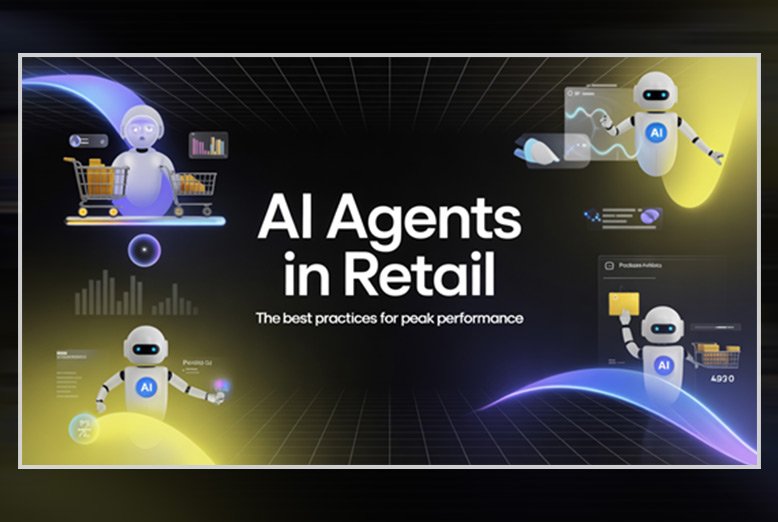According to Gartner forecast, AI Agents in Retail will handle nearly 15% of everyday decisions autonomously by 2028.
In the current scenario, consumers are pretty much used to the benefits of online shopping — personalized recommendations, AI chat support, and stead-fast deliveries. In the same way, they expect a similar level of convenience when they step into the physical store. That means the pressure is more on the retail leaders and store managers to develop at par in-store experience, all while keeping costs and profitability on the back of their mind.
In recent years, AI — and specially Gen AI — has been revolutionizing how businesses operate. Many brands are tapping into AI and ML to work intelligently, cut expenses, and drive paramount results. With retail struggling with rising operational costs and labor shortages, many companies are moving towards tech for solutions.
One such innovation is AI agents. Intelligent systems like the Skara AI Agent can conversate with people in natural language and take decisions on their own utilizing huge amounts of data.. They can evaluate situations, select the best course of action, explain their reasoning, and even learn from each interaction to get better over time.
AI Agents in Retail are being used in all sorts of ways across the retail world. In this blog, we’ll explore some of the best practices for using AI agents effectively in retail. Let’s get started.
Highlighting Best practices of AI Agents in Retail Ecosystem
#1 Choose the Right Type of AI Agent for Retail Operations
In the dynamic world of retail, not all AI agents are created equal — and selecting the right type can make or break the success of your AI implementation. Each retail function needs different agent abilities, so grasping your operational requirement is the foremost step.
For instance, simple reflex agents are ideal for automating routine customer interactions, such as answering common product queries (“Is this item in stock?”) or providing store hours. These agents operate on if-then rules and respond instantly without needing deep context, making them efficient for basic customer service use cases.
But, as the complexity of task climbs like dynamic pricing adjustments, personalized product recommendations, or inventory optimizations based on real-time demand. Retailers are required to deploy more advanced agents like utility based or goal-based agents. These agents evaluate numerous things like – seasonality, inventory levels, promotional strategy, customer profile, etc. before taking decisions that goes with the business goals such as customer satisfaction or maximizing revenue.
Hence, by aligning the Retail AI agent’s capabilities with specific goals, brands can enhance their operational efficiency, CX, and extract max value from AI deployments. The main thing is to match the type of agent to the complexity and strategic intent of the retail function it supports.
#2 Integration with existing systems
AI agents in retail cannot operate in isolation—they are only as effective as the systems they’re connected to. Successful AI implementation, especially in retail and e-commerce, hinges on seamless integration with existing enterprise systems. These agents should be embedded across workflows, not treated as standalone silos.
For instance, consider an AI-infused virtual shopping assistant on a fashion retailer’s website. To offer real-time product recommendations, it must access:
- Customer purchase history (via CRM)
- Current product listings (from the eCommerce CMS)
- Inventory levels (to avoid suggesting out-of-stock items)
- Ongoing promotions or pricing rules (from ERP or pricing engine)
If the AI agent is in silo and does not have access to this data, it may suggest irrelevancy or unavailability of the product, impacting the entire customer experience.
To make this possible instead of relying on APIs – which can be difficult to integrate if the number of integrations need is high. With the new technology coming up – making data truly integrated is just a few years away.
#3 Loop in Humans — To Elevate In-Store and Online Experiences
Human intervention in the Agentic AI loop, can ensure empathy, accuracy, and alignment with brand values across the retail value chain. While AI can handle routine tasks efficiently, there will always be situations—like nuanced customer complaints, ethical dilemmas, or unexpected issues.
In such situations, retailers should always prepare a fallback scenario where AI agents relentlessly transfer the control to humans. Also, retailers should track where humans frequently intervene—those are signals for enhancing your agent’s training data or rule sets.
#4 Security and Compliance[KS1] : Safeguarding Customer Trust in Retail
In the retail sector, AI agents often take up sensitive customer data like – purchase history, personal preferences, and payment detail. So, for all this, security is the topmost concern and regulatory compliance is a necessity. It’s crucial for maintaining trust and brand reputation.
Retailers must undergo strict adherence and ensure that all tool inputs are sanitized, enforce strict access controls, and conduct regular security assessments using techniques like Dynamic Application Security Testing (DAST), Static Application Security Testing (SAST), and Software Composition Analysis (SCA).
With these security measurements, retailers can maintain clarity with their customers about how their data is utilized by the AI systems, providing them with opt-in mechanism where necessary.
In this way, retailers not only avoid legal issues but also curate a safer and more trusted AI-led shopping experience.
Parting Thoughts
Therefore, retailers who are leading the industry are the one with big pockets, they are actually the ones who are focusing on dealing with critical problems, customer experience, and building a more intelligent, integrated, evolving AI system.
So, if you are looking out for an intelligent and a scalable way to get started with your AI journey, Agenthood AI by Polestar Analytics is built for that where you can easily integrate your retail stack and deliver real-time intelligence where it matters the most. Get a demo today!







